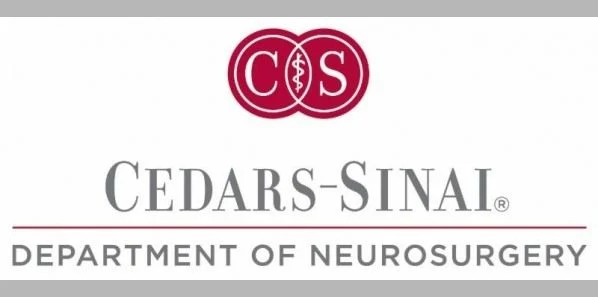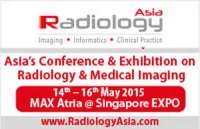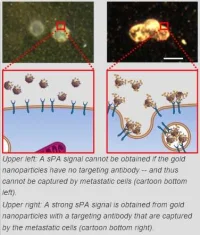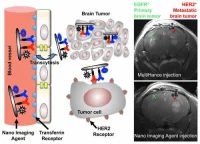Nobel laureate Martin Chalfie, PhD, will be the keynote speaker at Cedars-Sinai’s 3rd Nanomedicine for Imaging and Treatment Conference on 13-14 March 2015. The biennial event will bring together two dozen experts from around the world to discuss emerging trends in the study and treatment of diseases at the molecular and atomic levels.
During the conference, leading researchers and clinicians from biotech industries, educational institutions, National Institutes of Health and medical facilities will present lectures and abstracts about advances in nanomedicine and the development of imaging and drugs in this specialised field.
Nanomedicine is conducted at microscopic levels – at a scale of about one to 100 nanometres. A nanometre is equal to one billionth of a metre. A sheet of paper is about 100,000 nanometres thick.
“This conference will give many top scientists and physicians an opportunity to share insights as the field of nanomedicine matures and we home in on new ways to diagnose, treat and cure diseases,” said Keith Black, MD, chair and professor of Cedars-Sinai’s Department of Neurosurgery.
Chalfie, chair of the Department of Biological Sciences at Columbia University, received the 2008 Nobel Prize in Chemistry for his part in the discovery and development of green fluorescent protein, found in a species of jellyfish. The protein glows when excited by light. As the protein can be attached to many biological substances to make them readily visible, it has become a fundamental tool in a wide range of medical and scientific fields.
This year’s programme will focus on three issues:
In addition, participants are expected to discuss issues relevant to the biotech industry and the legal profession.
Julia Ljubimova, MD, PhD, the nanomedicine conference’s leading organiser, has worked with colleagues at Cedars-Sinai and UCLA to develop an experimental nanodrug – 20 to 30 nanometres in size – to deliver antitumour therapies to brain and breast cancers. “By engineering nanoscale particles, we have the potential to target diseases and deliver therapies in ways never before possible,” said Dr. Ljubimova, professor of neurosurgery and biomedical sciences.
"Nanotechnology is rapidly shifting from experimental to clinical applications, making this an exciting time to bring together many of the brightest minds in the field,” added Dr. Ljubimova, also director of the Nanomedicine Research Center in the Department of Neurosurgery and director of the Nanomedicine Program at the Samuel Oschin Comprehensive Cancer Institute.
The nanomedicine conference is presented by Cedars-Sinai’s Department of Neurosurgery, Biomedical Imaging Research Institute and Samuel Oschin Comprehensive Cancer Institute. It will be held at Cedars-Sinai’s Harvey Morse Auditorium. Additional information is available at www.nanobiomed2015.org, and online registration can be arranged here.
Source: Cedars-Sinai Medical Center
Image Credit: Flickr.com
During the conference, leading researchers and clinicians from biotech industries, educational institutions, National Institutes of Health and medical facilities will present lectures and abstracts about advances in nanomedicine and the development of imaging and drugs in this specialised field.
Nanomedicine is conducted at microscopic levels – at a scale of about one to 100 nanometres. A nanometre is equal to one billionth of a metre. A sheet of paper is about 100,000 nanometres thick.
“This conference will give many top scientists and physicians an opportunity to share insights as the field of nanomedicine matures and we home in on new ways to diagnose, treat and cure diseases,” said Keith Black, MD, chair and professor of Cedars-Sinai’s Department of Neurosurgery.
Chalfie, chair of the Department of Biological Sciences at Columbia University, received the 2008 Nobel Prize in Chemistry for his part in the discovery and development of green fluorescent protein, found in a species of jellyfish. The protein glows when excited by light. As the protein can be attached to many biological substances to make them readily visible, it has become a fundamental tool in a wide range of medical and scientific fields.
This year’s programme will focus on three issues:
- Nanomedicine and imaging: How far are we from patient care?
- Latest preclinical and clinical advances in the treatment of cancer, neurodegenerative disorders and other pathological conditions.
- The role of the National Institutes of Health in nanodrug and nano-imaging development.
In addition, participants are expected to discuss issues relevant to the biotech industry and the legal profession.
Julia Ljubimova, MD, PhD, the nanomedicine conference’s leading organiser, has worked with colleagues at Cedars-Sinai and UCLA to develop an experimental nanodrug – 20 to 30 nanometres in size – to deliver antitumour therapies to brain and breast cancers. “By engineering nanoscale particles, we have the potential to target diseases and deliver therapies in ways never before possible,” said Dr. Ljubimova, professor of neurosurgery and biomedical sciences.
"Nanotechnology is rapidly shifting from experimental to clinical applications, making this an exciting time to bring together many of the brightest minds in the field,” added Dr. Ljubimova, also director of the Nanomedicine Research Center in the Department of Neurosurgery and director of the Nanomedicine Program at the Samuel Oschin Comprehensive Cancer Institute.
The nanomedicine conference is presented by Cedars-Sinai’s Department of Neurosurgery, Biomedical Imaging Research Institute and Samuel Oschin Comprehensive Cancer Institute. It will be held at Cedars-Sinai’s Harvey Morse Auditorium. Additional information is available at www.nanobiomed2015.org, and online registration can be arranged here.
Source: Cedars-Sinai Medical Center
Image Credit: Flickr.com
Latest Articles
Cancer, biotechnology, nanomedicine, nanodrug, nano-imaging
Nobel laureate Martin Chalfie, PhD, will be the keynote speaker at Cedars-Sinai’s 3rd Nanomedicine for Imaging and Treatment Conference on 13-14 March 20...










